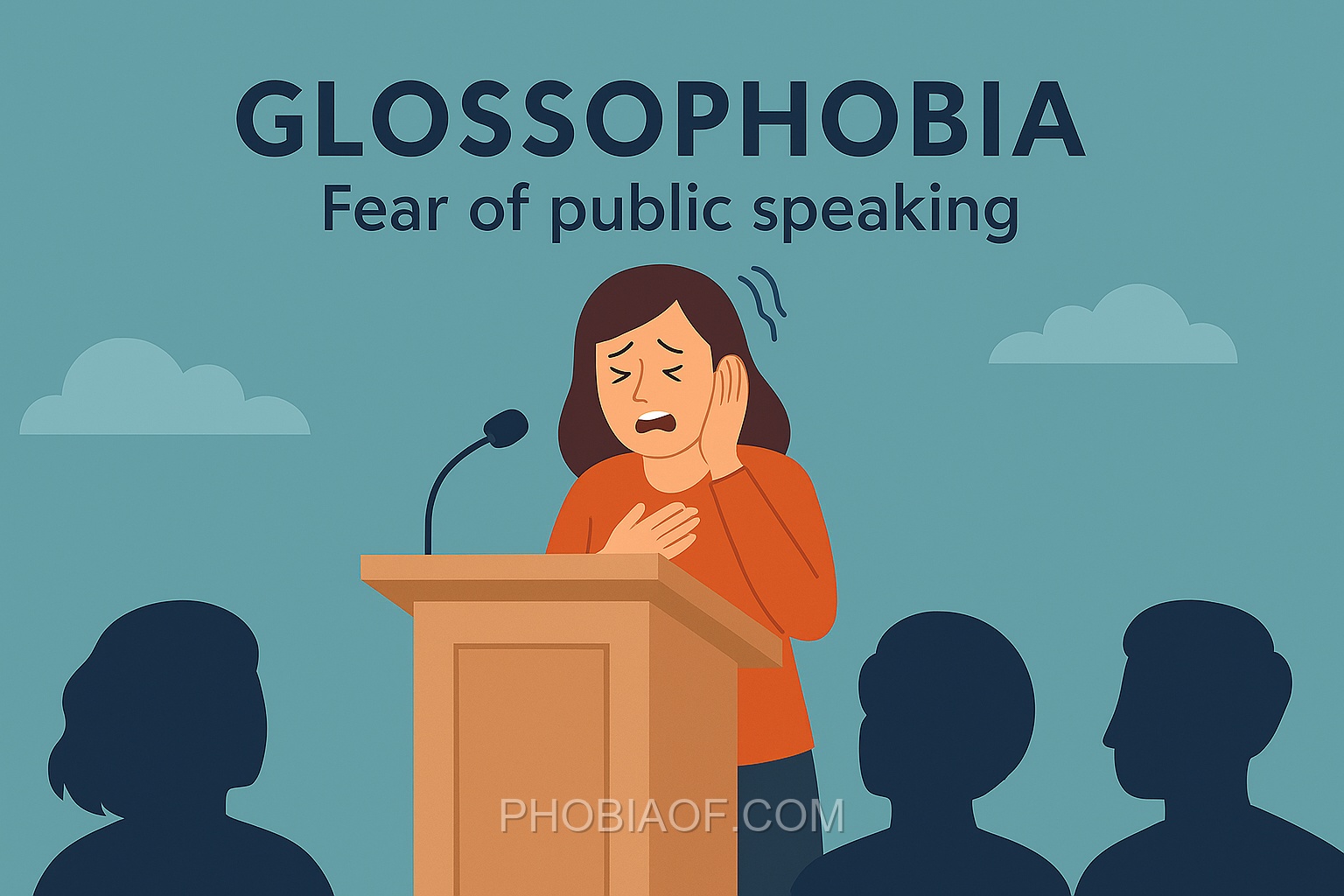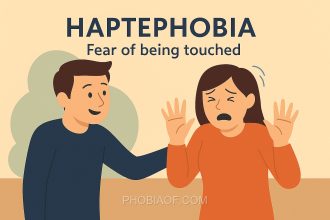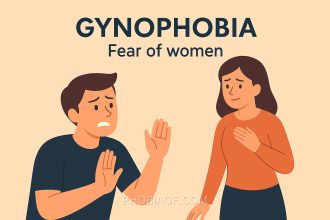Have you ever felt your heart race or your palms sweat just at the thought of speaking in front of a crowd? If so, you’re not alone. This common experience is known as Glossophobia, or the fear of public speaking.
Glossophobia is a term derived from the Greek words “glossa,” meaning tongue, and “phobos,” meaning fear. In everyday language, it refers to the intense anxiety or nervousness some people feel when they are required to speak in public.
For many, this fear can have a significant impact on their personal and professional lives. It can manifest in various ways, including:
- Avoidance of opportunities to speak in public, potentially hindering career advancement or personal growth.
- Physical symptoms such as sweating, shaking, or a racing heart when faced with the prospect of speaking to an audience.
- Difficulty concentrating or remembering points during a speech due to overwhelming anxiety.
Understanding and addressing glossophobia with empathy and effective strategies can help individuals overcome this barrier and improve their communication skills. Whether through practice, professional support, or gradual exposure, conquering the fear of public speaking can open doors to new opportunities and personal fulfillment.
Causes of Glossophobia
Glossophobia, or the fear of public speaking, affects a significant portion of the population. Understanding its causes can help individuals address and manage this common phobia. Below are several factors that might contribute to the development of glossophobia.
- Genetic Predisposition:
Some research suggests that glossophobia may have a genetic component. If a close family member has a phobia or anxiety disorder, there might be an increased likelihood of developing similar fears. This genetic predisposition can influence how someone reacts to stress or anxiety-inducing situations.
- Traumatic Experiences:
Experiencing a negative event related to public speaking can lead to glossophobia. For instance, being ridiculed or criticized during a presentation can create a lasting fear of speaking in front of others. These traumatic experiences often leave a lasting impression that can trigger anxiety in future public speaking scenarios.
- Learned Behavior from Others:
Glossophobia can also be learned by observing others. If a child frequently sees parents or role models exhibit anxiety about public speaking, they might internalize these fears. This learned behavior can manifest as glossophobia later in life.
- Psychological Factors:
Individuals with higher levels of general anxiety or those who are particularly self-conscious may be more prone to developing glossophobia. Personal beliefs about self-worth and fear of judgment can exacerbate the fear of public speaking.
- Environmental Factors:
The environment in which one grows up can also shape fears. A highly critical or high-pressure environment might instill a fear of failure, making public speaking a daunting task. Conversely, supportive environments can help mitigate these fears.
Interestingly, some theories suggest that glossophobia may be rooted in evolutionary survival mechanisms. The idea is that being the center of attention could have signaled vulnerability to threats in ancient times, thus activating a fight-or-flight response. Although this theory is intriguing, more research is needed to fully understand its implications.
By identifying these potential causes, individuals may find it easier to confront and manage their fear of public speaking. Understanding the root of the problem is often the first step towards overcoming it.
Symptoms of Glossophobia
Glossophobia, or the fear of public speaking, can provoke intense fear or anxiety, often overwhelming those who experience it. This phobia can manifest in both physical and emotional/behavioral symptoms, making it challenging to manage. Recognizing these symptoms is the first step towards understanding and addressing the condition.
Common Physical Symptoms:
- Panic attacks that can occur before or during speaking engagements
- Excessive sweating, particularly in the palms or underarms
- Rapid heartbeat or palpitations, even when just anticipating speaking
- Trembling or shaking, noticeable in the hands or voice
- Shortness of breath or a sensation of choking
- Nausea or an upset stomach prior to or during public speaking
- Dizziness or lightheadedness, sometimes accompanied by a sensation of fainting
Common Emotional/Behavioral Symptoms:
- Overwhelming dread or anxiety in the days or weeks leading up to a speaking event
- Avoidance of situations where speaking in front of others might be required
- Difficulties concentrating or focusing due to anxiety about speaking
- Feeling of helplessness or a lack of control in speaking scenarios
- Negative self-talk or self-doubt regarding one’s ability to speak publicly
- Intense desire to escape or leave the situation when required to speak
- Fear of being judged or embarrassed in front of others
When severe, these symptoms can significantly interfere with daily life, impacting personal, educational, and professional situations where public speaking may be necessary.
Treatment for Fear of Public Speaking
Glossophobia, or the fear of public speaking, is a common phobia that many people struggle with. The good news is that this fear can be treated and managed effectively over time. With the right approach and support, you can gain confidence and ease in speaking publicly.
Here are some proven therapies and coping strategies to help you overcome glossophobia:
Therapies
- Exposure Therapy: This therapy involves gradually facing your fear of public speaking in a controlled and supportive environment. By slowly increasing exposure, you can reduce anxiety and build confidence.
- Cognitive-Behavioral Therapy (CBT): CBT helps you identify and change the negative thoughts that contribute to your fear. By reframing these thoughts, you can alter your emotional response and behavior.
- Counseling: Working with a counselor can provide personalized support and guidance, helping you understand the roots of your fear and develop strategies to overcome it.
Self-Help Coping Techniques
- Relaxation Exercises: Techniques such as deep breathing, progressive muscle relaxation, and visualization can help calm your mind and reduce anxiety before speaking.
- Meditation: Regular meditation practice can improve focus, reduce stress, and enhance your ability to manage anxiety.
- Support Groups: Joining a support group can provide encouragement and a sense of community. Sharing experiences with others who face similar challenges can be incredibly empowering.
In some severe cases, medication such as anti-anxiety drugs might be prescribed to help manage symptoms. However, the focus should remain on therapy and developing coping skills.
Remember, seeking professional help is a strong and positive step if glossophobia is interfering with your life. With determination and the right support, you can overcome this fear and speak with confidence.
Conclusion
Understanding the causes and symptoms of glossophobia is a crucial step towards empowerment and self-improvement. By identifying the triggers and recognizing the manifestations of this common fear, individuals can begin to take control of their anxiety around public speaking. Awareness is the first step in developing effective strategies to manage and eventually overcome the phobia.
It is important to remember that you are not alone in this journey. Many people have successfully managed their fear of public speaking with time, patience, and the right support. Whether through self-help strategies, formal therapy, or support groups, there is a path forward for everyone. If you find that glossophobia is significantly impacting your life, consider reaching out to a mental health professional or talking to your doctor for guidance and support.
Remember, overcoming glossophobia is possible, and taking that first step towards understanding your fear is a powerful move towards confidence and freedom in public speaking.






